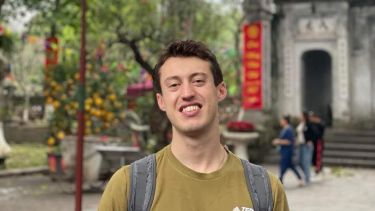Being part of the MAMLC programme at Sheffield is a great introduction to further education and academia in general

Why did you do the MA in Modern Languages and Cultures?
After completing my BA in French and Hispanic Studies at the University of Liverpool, I decided to move back to my hometown of Sheffield to follow a taught Masters programme in modern languages and cultures (MAMLC). The main draw for me was the flexibility of the programme, which allowed me to take a wide range of modules that focused on two modern languages (French and Portuguese).
How did the MA build on your undergraduate degree?
I studied three languages at undergraduate level (French, Spanish and Portuguese), which was great for language acquisition, but left little time to really explore the contexts in which those languages are spoken. MAMLC at Sheffield allowed me to delve into topics I’d been briefly introduced to during my undergrad, as well as some which I’d never been able to study before. In addition to this, the global approach to modern language studies at the University of Sheffield meant that I was using my
language skills to look at texts and topics from across the francophone and lusophone worlds.
Which areas did you specialise in?
The structure of the MAMLC programme at Sheffield is ideal for those who want an holistic, interdisciplinary continuation of their studies, that can combine all of your academic interests. In my first semester, I took modules in literature, sociolinguistics, and postcolonial studies, before discovering how naturally intertwined these three disciplines can be. In my second semester, I began experimenting with this interdisciplinary approach to modern language studies, before putting it all into practice with my MA dissertation (‘Language, Culture, and Identity: Towards a Repertoire Approach in Francophone Postcolonial Literature’).
What was it like being part of the postgraduate community with the School of Languages and Cultures?
Being part of the MAMLC programme at Sheffield is a great introduction to further education and academia in general. Staff encourage interdisciplinary approaches, which means you get to work with specialists from across the department and receive expert advice and direction regarding your research. Their passion and enthusiasm for their respective areas of research is undeniable, and as an MA student, you get to see this up-close as staff support you and guide you whilst you discover your own academic specialisms.
It became clear to me by the end of my first semester of MAMLC that I wanted to continue my studies after graduation. Staff at Sheffield were super encouraging of this, and helped me to kick- start my own academic trajectory, publishing and publicising some of my own research, in the forms of an academic conference and two academic journal articles. I was even able to lead a lecture and follow-up seminar for a second-year module.
Tell us about the process of applying for a PhD?
It’s probably not surprising, but the process of securing funding for a PhD is long and complicated. However, I worked closely with three members of staff at the University of Sheffield, each of whom I had worked with during my MA, and together we forged a really exciting and coherent research proposal. As we are all Sheffield-based, we were able to meet up on and around campus to discuss ideas for, and suggest edits to, my proposal. My supervisors have been exceptionally helpful, and if
this serves as a prelude to PhD study at Sheffield, then I am very excited to be working with them come September.
Tell us about your PhD and what you’ll be doing come September!
Just last week, I found out that I had secured Arts Council funding for my PhD, through Sheffield’s inclusion in the White Rose College of the Arts and Humanities. This means I will be able to do my PhD full-time at the University of Sheffield, and make use of facilities, research, and national/international partnerships at the universities of Sheffield, Leeds, and York.
My PhD will expand on some of the work I started during my MA, following a decolonial approach to language policy in Lebanon, that explores how historical language policy affects and influences present-day decision-making on language in Lebanon, on both a macro and micro level. With Arts Council funding, I will be able to undertake vital research in France and Lebanon, as well as receive specific and specialised training for all my research requirements (from Arabic-language acquisition to archival research navigation).

